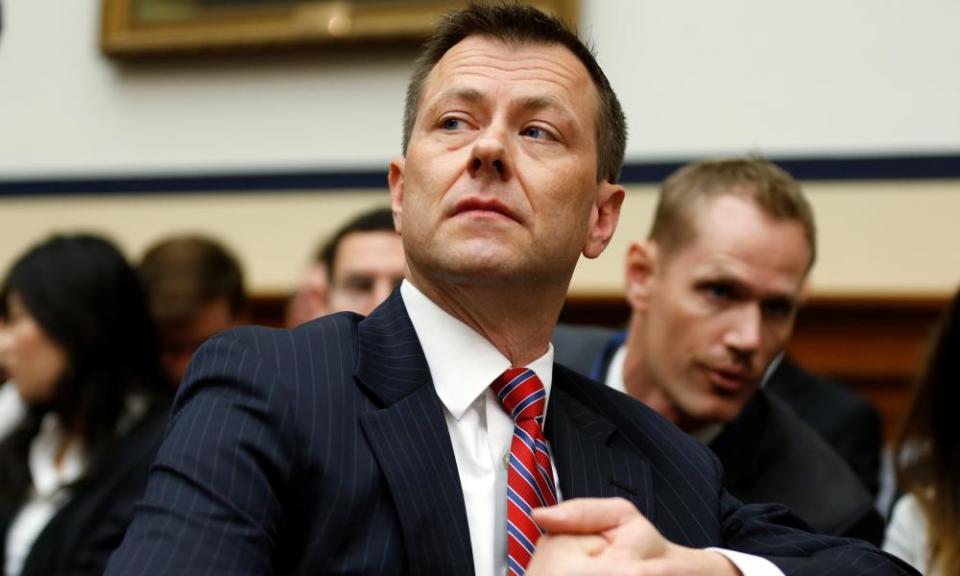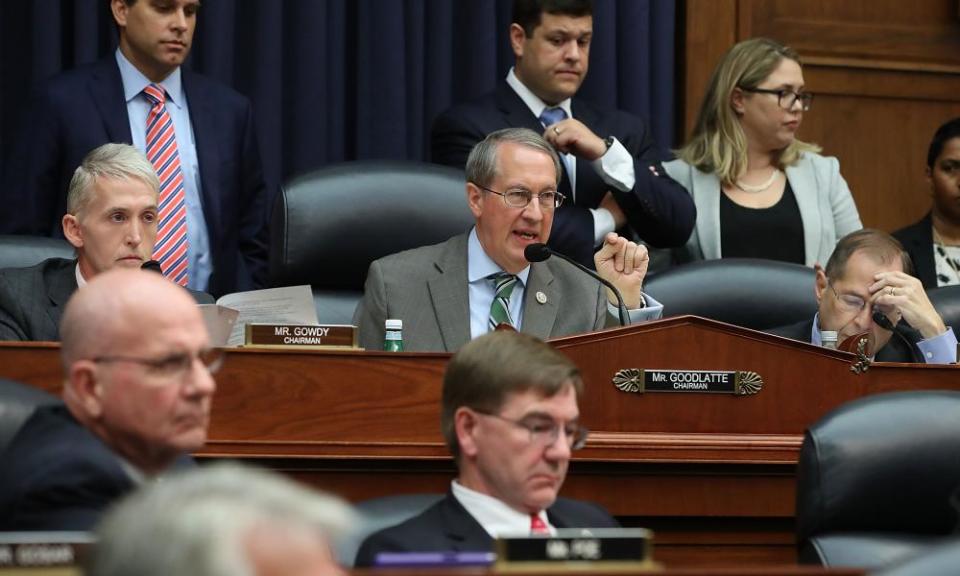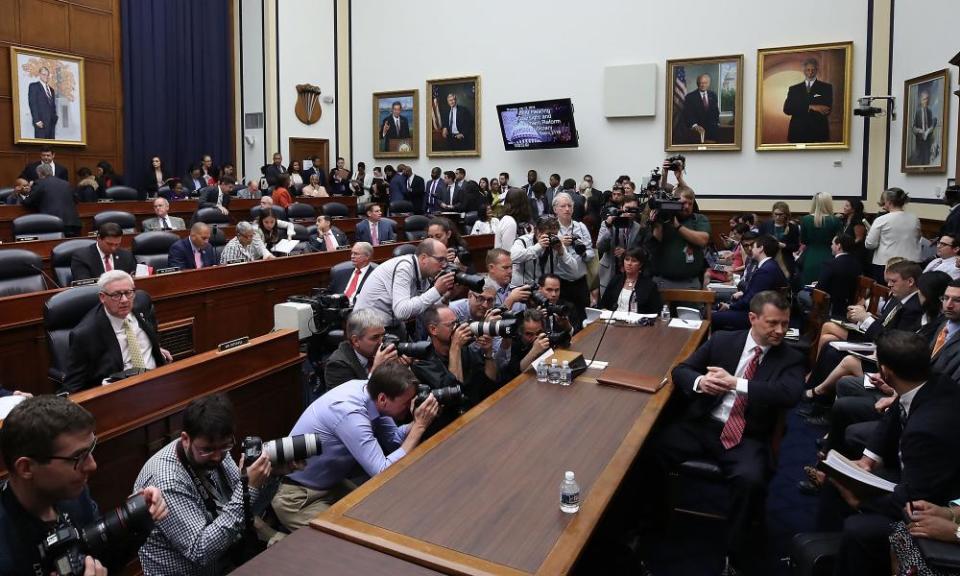FBI agent rejects allegations of anti-Trump bias as a 'notch in Putin's belt'
Peter Strzok, who is accused of bias while investigating possible collusion between the Trump campaign and Russia, says views did not affect work

An FBI agent whose anti-Trump text messages raised suspicion of bias in the Russia investigation aggressively defended his professionalism, telling lawmakers he never allowed personal views to affect official decisions and that Republican attacks against him were “another victory notch in Putin’s belt”.
Peter Strzok, who played a leading role in the FBI investigations into Hillary Clinton’s use of a private email server and potential collusion between the Trump campaign and Russia, testified publicly for the first time on Thursday before a joint hearing of the House judiciary and oversight and government reform committees.
“Let me be clear, unequivocally and under oath,” Strzok said in his opening statement, “not once in my 26 years of defending my nation did my personal opinions impact any official action I took.”
He continued: “I have the utmost respect for Congress’s oversight role, but I truly believe that today’s hearing is just another victory notch in Putin’s belt and another milestone in our enemies’ campaign to tear America apart.”
The day-long hearing laid bare the stark partisan divide surrounding the continuing Russia investigation. At several points during the evening, lawmakers’ remarks devolved into bitter shouting matches while some Republicans leveled personal attacks on the witness.
Republicans have seized on the private text messages between Strzok and an FBI lawyer, Lisa Page, as evidence of what they argue is widespread political bias at the highest levels of the justice department. Trump has tweeted on several occasions about the exchanges as an example of what he believes is a politically motivated “witch-hunt” against him.
The special counsel Robert Mueller removed Strzok from the Russia investigation after the justice department’s inspector general discovered the derogatory messages between the agents, who were involved in a relationship. Page no longer works at the FBI.
In one text message, dated 8 August 2016, three months before the election, Page asked: “[Trump’s] not ever going to become president, right? Right?!”
Strzok replied: “No. No he’s not. We’ll stop it.”

Strzok said he regretted the text messages – which were exchanged on work phones – and acknowledged they created the perception of bias. But he insisted his messages showed he was critical of candidates from both political parties – not only Trump. And Strzok said that the text message in which he said “we’ll stop it” was sent late at night after Trump “insulted” the family of the army captain Humayun Khan, who was killed in Iraq in 2004.
The hearing began with a fiery back-and-forth between Strzok and the Republican congressman Trey Gowdy, chairman of the House oversight committee, who accused the agent of harboring “ an unprecedented level of animus” against the president.
The exchange escalated when Strzok declined to answer a question about how many individuals he had interviewed at the start of the Russia inquiry in the summer of 2016. Strzok said “based on the direction of the FBI” he could not answer questions related to a current investigation.
Bob Goodlatte, the Republican chairman of the House judiciary committee, threatened to hold Strzok in contempt of Congress if he did not answer the question. Democrats immediately challenged Goodlatte’s threat and attempted to adjourn the meeting.
The exchange concluded with Strzok delivering a forceful defense of himself and the integrity of the FBI.
“At every step, at every investigative decision, there were multiple layers of people above me, the assistant director, executive assistant director, deputy director and director of the FBI, and multiple layers of people below me, section chiefs, supervisors, unit chiefs, case agents and analysts, all of whom were involved in all of these decisions,” he said. “They would not tolerate any improper behavior in me any more than I would tolerate it in them.
“And the suggestion that I, in some dark chamber in the FBI, would somehow cast aside all of these procedures, all of these safeguards, and somehow be able to do this is astounding to me,” he said. “It simply couldn’t happen.”
As the hearing stretched into the afternoon, the Republican congressman Louie Gohmert invoked Strzok’s extramarital affair with Page to question the agent’s credibility.
“I can’t help but to wonder when I see you sitting there with your little smirk, how many times did you look so innocent into your wife’s eyes?” Gohmert said.
The room erupted and lawmakers began yelling at one another. Democrats accused Gohmert of “impugning” Strzok’s character. One Democrat said the Republican lawmaker “should take his medication”.

When the room calmed, Strzok replied: “I have always told the truth.” He added that Gohmert’s question about “a family member who I have acknowledged hurting” revealed “more about your character and what you stand for”.
Democrats called the hearing a “circus” and a “politically motivated charade” and an attempt by Republicans to undermine Mueller’s Russia investigation.
Elijah Cummings, the top Democrat on the committee, highlighted that point during his opening remarks. As he spoke, his aides held posters with the faces of five Trump associates who have pleaded guilty in the Mueller investigation.
The hearing comes one month after the release of a 500-page inspector general’s report, which concluded the pair’s text messages “cast a cloud” over the investigation into Clinton’s email server. The report was critical but ultimately concluded political bias did not play a role in the agency’s decision not to pursue criminal charges against Clinton. Christopher Wray, the FBI director, has referred employees identified in the report to the agency’s investigative arm for possible disciplinary action.
House Republicans meanwhile reached an agreement with Page to testify before the committees on Friday after threatening to hold her in contempt for defying a subpoena to appear on Wednesday.
Page’s lawyer told the Associated Press that she wanted to share her side of the story before the committee, but had requested more time to review the documents and prepare for the hearing.

